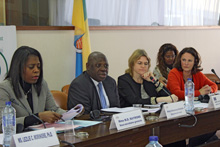Statement by the Secretary General in launching the ACP Compendium of Risk Knowledge, 12 February 2015, Brussels
 [Protocols]
[Protocols]
It gives me great pleasure to welcome you all, on behalf of the ACP Group, to the launching of the study for the ACP Compendium of risk knowledge: Mapping Disaster risk in ACP countries and Regions.
In the framework of the 10th EDF intra-ACP envelope, the ACP Group of States and the European Commission, decided to dedicate 180 million Euros, to the Natural Disaster Risk Reduction Program, whose objective is to address prevention, mitigation, and preparedness to natural hazards in ACP countries through technical assistance, capacity building and advisory/analytical support at regional and national levels.
Recognizing the importance of the subject matter, concerning the well-being of ACP populations in the respective environments, the ACP Secretariat found it useful to undertake a study, whose objective is to raise awareness and understanding among ACP policy and decision makers of the risks faced by the ACP regions and countries, to natural hazards and their impact on development.
As such the ultimate goal of this compendium is to provide to political leaders, policy makers and practitioners, scientific tools for disaster risk management and mitigation in ACP regions and countries. This requires communities and governments, from local to national, and across different sectors such as finance, planning and infrastructure, to own and share a common and robust understanding of risk, and to take responsibility for managing and, where possible, mitigating these risks. Further, it is vital that all practitioners from scientists and engineers, to policy-makers and communities, work together to ensure that every improvement in our understanding of risk leads to better decisions, tangible change, and therefore safer communities.
Distinguished Participants,
Ladies and Gentlemen,
The current economic dynamic forces at play in the international arena, and the inevitable socio-economic challenges, require developing countries to re-align their sustainable development priorities with pragmatic responses. As such it is prudent to emphasize that managing risk leads to high returns on investments and more resilient citizens, communities and countries.
As most developing countries strive to address the gaps towards the attainment of the Millennium Development Goals (MDGs), it is vital to invest in building and strengthening regional and national infrastructures, as well as increasing domestic and international funding disaster management and risk reduction. Further, it is imperative to encourage innovative partnerships that integrate environmentally-friendly interventions which incorporate best practices in the use of appropriate scientific tools, including Information and Communication Technologies (ICTs), in disaster management and risk reduction.
It should be noted that the Global Assessment Reports published by the United Nations International Strategy for Disaster Reduction (UNISDR), have reviewed how governments are scaling up disaster risk management (DRM) by adapting existing development instruments, such as national planning, public investment systems, and social protection mechanisms. This is a very encouraging trend for developing countries, especially ACP countries which are prone to natural disasters.
In this study we are launching today, it is important to also highlight the role of the private-sector in Disaster Risk Reduction (DRR), where there are agreed standards on DRR that must be adopted appropriately by the private sector. It should be noted that the studies have also shown, that disaster risk will continue to increase in many countries as more vulnerable people and assets are exposed to weather extremes. Climate change has altered the magnitude and frequency of some extreme weather and climate events in some regions already.
I thank the European Commission for its constant commitment in favour of ACP countries and for making possible the realization of the Compendium.
In conclusion, let me wish you fruitful deliberations. I am sure your contributions in our deliberations today will complement the efforts towards an ACP Compendium of Risk Knowledge.
I thank you for your kind attention.
Alhaji Muhammad Mumuni
ACP Secretary General
****
